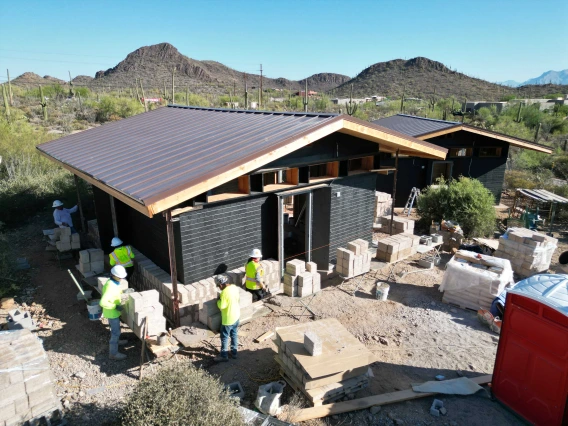Extreme Heat and the COVID-19 Pandemic: Global Heat Health Information Network Launches Comprehensive Online Resource

Heat and COVID-19, a new resource from the Global Heat Health Information Network (GHHIN) that launched in May, provides an array of science-based resources on coping with heat during the COVID-19 pandemic.

Ladd Keith, Assistant Professor of Planning and Sustainable Built Environments
Ladd Keith, assistant professor of planning and sustainable built environments in the College of Architecture, Planning and Landscape Architecture at the University of Arizona, was one of 40 international experts on extreme heat, public health and epidemiology who contributed to the website. Ladd’s contributions focused on the intersection between extreme heat, urban planning and local governance.
The world’s changing climate is fueling more intense extreme heat more frequently than ever before. The last five years (2015 to 2019) saw the hottest average global temperatures ever recorded, and longer, hotter heatwaves on every inhabited continent.
And now, responding to the global COVID-19 pandemic is foremost in people’s minds. Communities large and small around the world are facing questions about how to cope simultaneously with these two huge health threats. No one has had to simultaneously combine and implement COVID-19 protections and extreme heat protections before.
“We pulled these important resources together rapidly given the urgency of the COVID-19 pandemic,” says Keith. “The resources underwent stringent peer review by 30 experts including the World Health Organization and World Meteorological Organization, who support GHHIN.”
The cascade of health impacts that could follow from the Northern Hemisphere’s summer while we are still under a pandemic is a very real concern. And, to complicate matters further, many of the same people whose health is especially vulnerable to extreme heat are also highly vulnerable to COVID-19—including older adults, people who are obese or have diabetes, people with economic disadvantage or inadequate housing and people with pre-existing heart, lung or kidney ailments. These vulnerabilities don’t affect all places and communities equally, highlighting the need for response strategies that can also reduce health inequities.
Besides a short summary on how to promote heat-health safety and COVID-19 prevention, the Heat and COVID-19 site features frequently asked questions on a range of topics, including seasonality of COVID-19 and weather, vulnerable populations, personal protective equipment and heat stress and fever versus heat stress.
While some of GHHIN’s online resources are geared toward people who develop and coordinate heatwave preparedness and response efforts, there’s useful information for everyone. The United States sees 65,000 heat-related emergency room visits on average each year. The information on GHHIN’s site may help prevent a trip to the doctor to treat a heat-related illness.
Healthcare professionals, first responders and public health systems are already stressed by the ongoing COVID-19 pandemic, and this summer brings added complications. Many communities won’t be operating municipal cooling centers due to restrictions on shared public spaces and avoiding close proximity, for instance. That makes it more important than ever to keep housing and space conditioning well-maintained and affordable to enable families to stay at home.
“Both COVID-19 and extreme heat impact marginalized communities around the world the most and can be challenging to address at the same time. Strategies such as cooling centers and shaded outdoor spaces for heat relief have to be rethought in light of the pandemic. We hope that these resources will help local governments prepare and respond to both risks,” says Keith. “Our understanding of COVID-19 is developing quickly so we will update the resources as we learn more.”
GHHIN is a global partnership spearheaded by the World Meteorological Organization, World Health Organization Joint Climate and Health Office and U.S. National Oceanic and Atmospheric Administration. GHHIN focuses on providing information to protect people from avoidable heat-health risks in a changing climate.
View the Heat and COVID-19 website at www.ghhin.org/heat-and-covid-19.
Portions of this story were contributed by Kim Knowlton, senior scientist and deputy director, Science Center, Natural Resources Defense Council. Header photo courtesy Global Heat Health Information Network.



